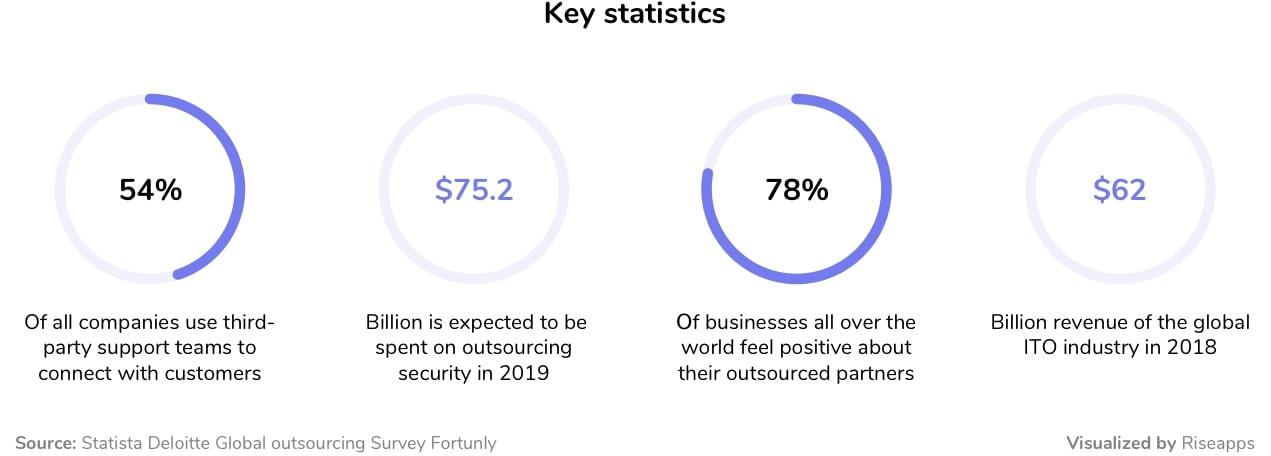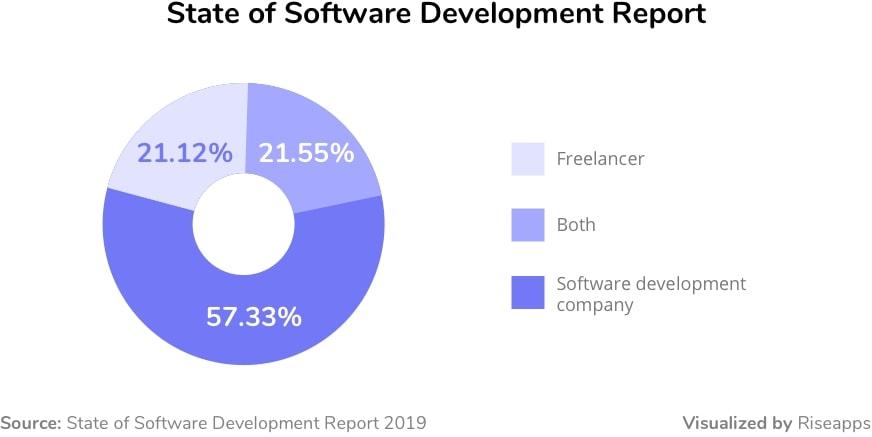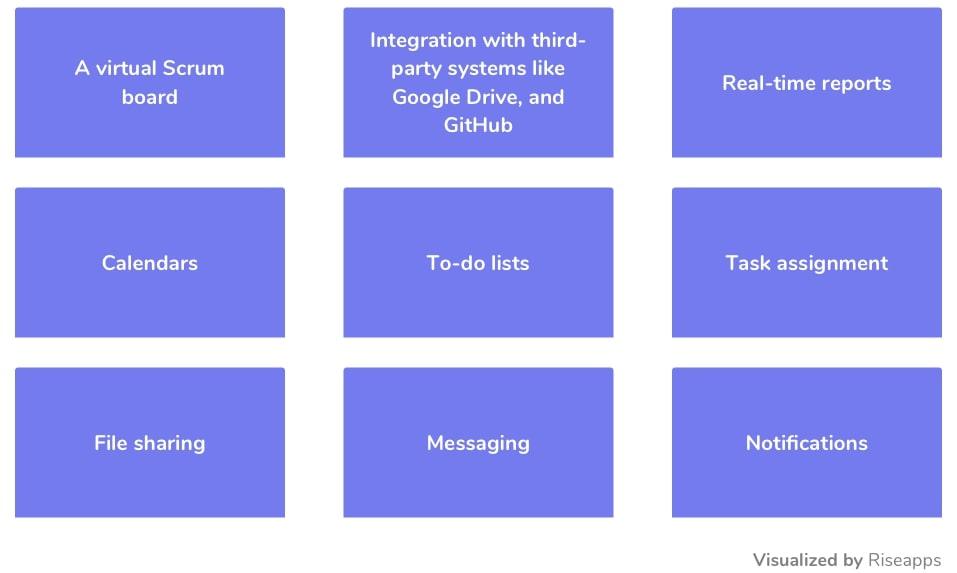Working with a Remote Development Team: How to Avoid Risks and Meet Deadlines

One of the riskiest yet the most rewarding things is trusting strangers. Business or personal life at some point you will need to leap into the unknown, find new partners, extend your business to new territories, hire new people, etc. To cope with the unknown, typically we estimate risks, read reviews and testimonials and get mutual understanding.
Building the new product or developing an idea is a risky endeavor itself, and having the trusted partners on your side can reduce the general pressure.
With this article, we help you understand how to find common ground with the remote development team, not to dive in micromanagement and stay focused on the strategy.
Why are Remote Teams Popular? Stats, Charts, Geo
Let’s be honest. All of us dream big, still, not all of us have endless capital to support our dreams. Thus, we need to be creative. Companies divide into two types: with in-house developers, that can build and support tech-related projects; and those that work with the remote developers/teams. We have written the article “In-house Development vs. Outsourcing” and recommend reading it to learn more about the difference.
The global outsourcing trend started in 1989 when companies understood that supporting an in-house extended software development team doesn’t pay off, especially in the case when your company’s main activity isn’t software development. Several decades later, the demand for outsourcing developers and teams became global.

The most apparent and widely cited reason to deal with the remote teams is freeing up resources the get the ability to focus on the core business. What’s interesting, saving money gets only second place.
The key idea here is that the software development outsourcing enables us to achieve more significant economies of scale, while focusing on the company’s core competencies, saving time and costs.
As the State of Software Development Report goes, more than 65% of the respondents have already outsourced their software development to the third-parties. Almost 60% of them have chosen skilled software development companies.

Pros and Cons of Remote Development Team
Outsourcing remote development has its own pros and cons. There are numerous advantages of remote development teams. Nevertheless, we advise you to stay realistic and pay attention to the disadvantages of working with outsourced development teams. The logic is simple. The more you know about potholes, the more you can do to avoid them. Here we go.
Advantages
- You will pay less
We are going for it outsourcing for lower prices and high quality. For instance, developers in the US are overpriced, and their rates are several times higher than in Eastern Europe.
Read Also: Outsourcing Software Development to Eastern Europe. How to Do it Right?
It’s not only about the monthly wages you need to pay in case of an in-house development team, but the additional costs an employer needs to cover, e.g., taxes, insurance, office maintenance, etc. With outsourced teams, you pay for the hours spent working for your project or a fixed service fee, nothing else. What’s more, you know your development budget in advance: all companies do the estimation according to your project’s features.
- You enter the bigger pool of talented developers
There are no borders and limits. You can hire skilled developers from all over the world, jungle with rates and time zones. Now you can find the best teams to suit your project goals and needs, put, your developers.
- You can kick off your development straight away
Hiring people for your in-office team can be very tiresome, a long-lasting process. An outsourced team, on the other hand, can start the project immediately, as the team is already formed and ready to work together.
- Are you a startup or SMB? This might be a perfect choice for you
Outsourcing pays off particularly for companies that are limited in funds, and cannot afford subsequent maintenance of stuff. Dealing with the remote teams makes it a simple 3-step action plan: find a team, explain what you want from them, and get it done. Once the work is done and the team is paid, there are no more obligations. It’s up to you to continue the communication with the team, order support, or end there.
Read Also: Comprehensive Guide on How to Hire a Developer for Startup
- You don’t need to bother yourself with management
Here comes a crucial moment: if you like to manage people and teams, it makes you feel safe and confident, working with remote teams may not be for you. Consider hiring freelancers. The main idea about working with an outsourced team is that the team has its own management within the team, that is done via team leads and the PMs. You, as a client, are kept informed about all the work done, the development roadmap. You stay in constant collaboration with the team’s PM to be updated on progress and to give feedback on the project’s demos, making sure this is how you want your project to be done. You are creating a general strategy, but not dealing with micromanagement. You have a PM in the outsourced team to does that.
- You get the combined knowledge gained from many projects
When approaching developers to make sure they have experience in delivering projects not only in your niche. The combined expertise of implementing different features, working with various technologies, and solving numerous management issues are defining experienced teams. The more real-life solutions the team has delivered, the better the results it may show while working with your project.
- You are in the driving seat always
You get access to control systems, that help you overview all the work done by the contractors, the deadlines they meat, the hours they spent. It’s in the PM’s interested in ensuring the highest productivity, so they continuously monitor the performance, and you can monitor all productivity reports.
- Legal guarantees are embedded
Dealing with the remote team model includes a contract signing phase. You get a contract form your provider, reflecting all the details: deadlines, rates, standards, the expected level of communication. With such agreements, it’s easy to build trust and transparency, which is crucial when delegating a project to remote teams. Moreover, every team member signs an NDA, eliminating the risk of information leakage.
Disadvantages
- The remote development team may have poor knowledge of your product
There is no person in the world, that knows your product from A to Z better than you. It is natural that any development team doesn’t know anything about your product at the very beginning. Therefore, it’s in your interest to reveal as many details about your product as possible, so that a development team will clearly understand all aspects of your idea. Furthermore, choose the development team with the previous experience in your project’s field, as they have a lot riding on similar development and they may be able to recommend the best industry practices.
- In may happen that your dev team and you are separated by the ocean
Significant time differences may cause long responding to your emails, and it’s super inconvenient to get on the call exceptionally early in the morning (not all of us are larks). Time differences may cause distractions to both you and your dev team. To eliminate possible inconvenience hire teams with proper management from suitable time zones, with significant time overlap, e.g., 5/6 hours.
- It may be challenging to keep everyone updated
It is recommended to keep your communication channel up to date and not to get spammed, especially if there are many people in your communication channel. Make sure your communication is on a topic so that it’s easy to get all updated information and stay in the loop.
- It may take a while to find an available team
You can hire a freelancer in a click of a mouse, as the requirements may be lower, project scope and budget a bit lower too. To find a trusted partner takes more time, as you need to shortlist your future partner and make sure the developers are available. Sometimes you will need to wait for the developers to finish their current projects, and get ready to start yours. However, sometimes, it is worth waiting for a professional team.
- It’s expensive to travel abroad
Sometimes you need to communicate with your team in person, so consider that the visits should be planned beforehand, and the relevant budget is dedicated
- You don’t want to be faced with an unpredicted tech gap
Technology differences may result in an unexpected issue. It’s vital to make sure that all hardware and software platforms are compatible with the target platforms where the developed software will run.
- You may not see eye to eye with developers
Problems with understanding may arise from cultural differences, attitude to time, and making business. Thus, pay attention to cultural differences between you and your development team.
Tools for Remote Development Team Management
How to manage remote teams? When start working with the remote development team, clarify the tools the team is using to keep you updated.
All in all, make sure the tool will help you to cover the following aspects:
- Tasks and time
- Communication
- Code management
Tasks and Time
Typically, the tools used to manage remote teams, time and task tracking include the most essential features.
 There are a lot of tools that cover the stated functions, e.g., Jira, Asana, Trello, Zoho, etc. According to our experience, Jira proved effective to track the development progress, log time dedicated to the task and to keep our clients updated.
There are a lot of tools that cover the stated functions, e.g., Jira, Asana, Trello, Zoho, etc. According to our experience, Jira proved effective to track the development progress, log time dedicated to the task and to keep our clients updated.
Communication
For communication purposes, you can choose different messengers, that support video calls. As for us, we stick to Slack, Google Hangouts, and Skype. One Important tip here: agree on only one tool for communication with your development team and stick to it. You need to receive all information through one channel, not to get lost and to keep records of the communication.
Code Management
Sometimes to track the development time isn’t enough; it’s vital to check the changes in the code. To manage the code, we typically use GitHub, GitLab, and Bitbucket.
All mentioned tools work in synergy, still, try not to overuse them: the number of tools won’t guarantee the quality.
How to Hire Remote Software Development Team and Get Right What You Need?
The best advice to avoid risks and meet deadlines is to make everything you can to choose the best contractor at the beginning, not to be tempted to change horses on the run. Thus, here are some tips that will help you achieve this.
- Select Right Region/Time Zone
Find the time zone that will be comfortable for you to work with. Your time zone is always the best choice; still, it’s not always an option. Even if you are dealing with the other time zones, make sure there is a significant time overlap. We suggest it should be from 5-6 hours, considering the 8-h working day.
- Select a Company with Solid Experience in Projects Similar or Identical to Your Niche
It’s safe explanatory. The team with a lack of experience in your sector and will spend more time on development. You don’t need to pay for their learning.
- Read Reviews and Testimonials
If the company has already worked with projects, as yours check what their former clients say about working with them. Check not only the reviews on the websites but on the resources like Clutch, GoodFirms, Upwork, etc.
- Select the Company with the Best Price/Quality Ratio
It’s hugely subjective to estimate the best ratio. Choose several criteria and make your own matrix to evaluate each candidate and their prices.
- Carefully Examine Their Contract/Terms of Services
Spend time to study terms of services, investigate and ask the legal advice before signing a contract.
- Compose and Sign a Contract
Make sure you are happy with the contract terms. Typically, outsourced contractors have their standard contracts; they have need using with every client. Nevertheless, pay attention to what you sign and negotiate for additional terms. Moreover, don’t forget to sign the NDA, to feel safe about your ideas and the project itself.
Wrapping up
Working with remote development teams is both risky and rewarding. Still, benefits outnumber all side effects that may arise during the road. Dealing with remote developer teams is your way of building a successful business with talented people from all around the globe and saving the budget. According to our experience, we cannot admit that the risk you take with remote developers is significantly higher than working with in-office teams. You are working with people; thus, for you to get all the benefits, dealing with and remote team management , spend time on choosing the perfect provider you can trust. Once, the remote software development team is found, it doesn’t matter where it is located as long as they perform what was promised.
Contact Us





![Flutter App Development vs React Native: How to Make a Right Choice [2021]](https://riseapps.co/wp-content/uploads/2019/07/Flutter-App-Development-vs-React-Native_-How-to-Make-a-Right-Choice-2021.png)

